Related Research Articles

Simon & Garfunkel were an American folk pop and folk rock duo consisting of singer-songwriter Paul Simon and singer Art Garfunkel. One of the best-selling music acts of the 1960s, their most famous recordings include three US number ones: "The Sound of Silence" (1965) and the two Record of the Year Grammy winners "Mrs. Robinson" (1968) and "Bridge over Troubled Water" (1970). Other hits include "The Boxer" (1969), "Cecilia" (1970) and the four 1966 releases "Homeward Bound", "I Am a Rock", "Scarborough Fair/Canticle" and "A Hazy Shade of Winter", as well as the 1968 album track "America".
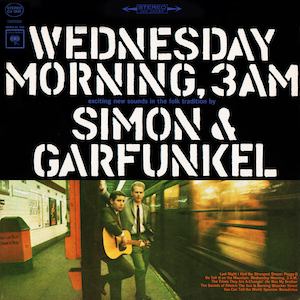
Wednesday Morning, 3 A.M. is the debut studio album by the American folk rock duo Simon & Garfunkel. Following their early gig as "Tom and Jerry", Columbia Records signed the two in late 1963. It was produced by Tom Wilson and engineered by Roy Halee. The cover and the label include the subtitle exciting new sounds in the folk tradition. Recorded in March 1964, the album was released on October 19.
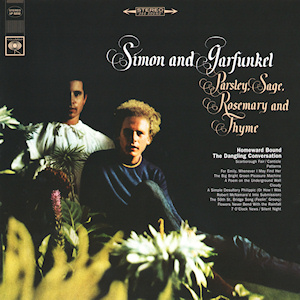
Parsley, Sage, Rosemary and Thyme is the third studio album by the American folk rock duo Simon & Garfunkel. Produced by Bob Johnston, the album was released on October 24, 1966, in the United States by Columbia Records. Following the success of the re-release of their debut single "The Sound of Silence", Simon & Garfunkel regrouped after a time apart while Columbia issued their second album, a rushed collection titled Sounds of Silence. For their third album, the duo spent almost three months in the studio working on instrumentation and production.
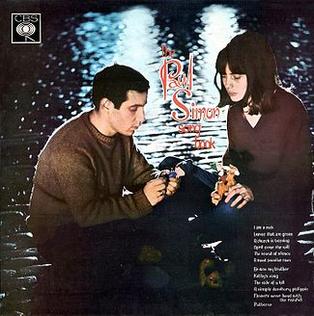
The Paul Simon Songbook is the debut solo studio album by Paul Simon. It was released in the UK in 1965. It was made available in the US as part of the LP box set Paul Simon: Collected Works (1981). The album was produced by Reginald Warburton and Stanley West as Columbia/CBS Records LP BPG 62579 in the UK; remastered CD Columbia/Legacy/SME CK 90281.

Paul Frederic Simon is an American singer-songwriter known both for his solo work and his collaboration with Art Garfunkel. He and his school friend Garfunkel, whom he met in 1953, came to prominence in the 1960s as Simon & Garfunkel. Their blend of folk and rock, including hits such as "The Sound of Silence", "Mrs. Robinson", "America" and "The Boxer", served as a soundtrack to the counterculture movement. Their final album, Bridge Over Troubled Water (1970), is among the bestselling of all time.
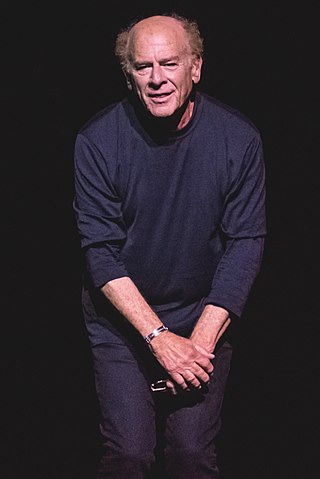
Arthur Ira Garfunkel is an American singer, actor and poet who is best known for his partnership with Paul Simon in the folk rock duo Simon & Garfunkel. Born in Forest Hills, Queens, New York, Garfunkel became acquainted with Simon through an elementary school play, a production of Alice in Wonderland, and sought a partnership. Their combined presence in music began in the 1950s, and throughout the 1960s the duo of Simon & Garfunkel achieved great chart success with tracks such as "The Sound of Silence", "Mrs. Robinson", "Scarborough Fair", "The Boxer" and "Bridge over Troubled Water". The latter song's title also served as the name of Simon & Garfunkel's final album in 1970. Simon & Garfunkel split for personal reasons, but the pair have occasionally reunited in the years since. Both men experienced success in solo careers in the years following the duo's breakup.
Paul Harrington is an Irish musician, who, with Charlie McGettigan, won the Eurovision Song Contest for Ireland in 1994.
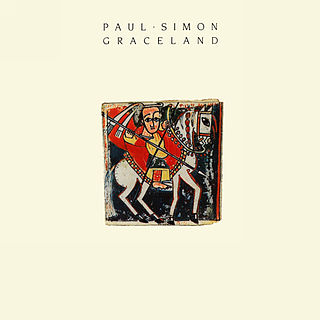
Graceland is the seventh solo studio album by the American singer-songwriter Paul Simon. It was produced by Simon, engineered by Roy Halee and released on August 25, 1986, by Warner Bros. Records. It incorporates genres including pop, rock, a cappella, and zydeco, and South African styles such as isicathamiya and mbaqanga.

"America" is a song performed by American music duo Simon & Garfunkel, which they included on their fourth studio album, Bookends, in 1968. It was produced by the duo and Roy Halee. The song was later issued as the B-side of the single "For Emily, Whenever I May Find Her " in 1972 to promote the release of the compilation album Simon and Garfunkel's Greatest Hits. After peaking in the charts in July 1972, the song was switched to the A-side of the single and re-entered the charts in November 1972.

"The Boxer" is a song written by Paul Simon and recorded by the American music duo Simon & Garfunkel from their fifth and final studio album, Bridge over Troubled Water (1970). Produced by the duo and Roy Halee, it was released as a standalone single on March 21, 1969, but included on the album nine months later. The song is a folk rock ballad that variously takes the form of a first-person lament as well as a third-person sketch of a boxer. The lyrics are largely autobiographical and partially inspired by the Bible and were written during a time when Simon felt he was being unfairly criticized. The song's lyrics discuss poverty and loneliness. It is particularly known for its plaintive refrain, in which they sing 'lie-la-lie', accompanied by a heavily reverbed snare drum.

"I Am a Rock" is a song written by Paul Simon. It was first performed by Simon as the opening track on his album The Paul Simon Songbook which he originally recorded and released in August 1965, only in the United Kingdom. Paul Simon and Art Garfunkel, as the American folk rock duo Simon & Garfunkel, re-recorded it on December 14, 1965, and included as the final track on their album Sounds of Silence, which they released on January 17, 1966. It was released as a single in 1966, and subsequently included as the B-side of the 1971 A-side reissue of "The 59th Street Bridge Song ".
"The Late Great Johnny Ace" is a song by Paul Simon, which appears on his 1983 Hearts and Bones album.
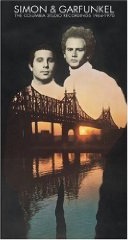
The Columbia Studio Recordings (1964–1970) is the third box set of Simon & Garfunkel recordings, released in 2001 by Columbia Records. This 5-CD set contains all of their studio albums from 1964 to 1970. The CDs are packaged in miniature recreations of the original LP jackets, and an annotated booklet is also included.

"Homeward Bound" is a song by the American music duo Simon & Garfunkel, released as a single on January 19, 1966, by Columbia Records. It was written by Paul Simon and produced by Bob Johnston. Simon wrote the song during his time in England, possibly while waiting for a train at Widnes railway station in the northwest of England.

"Mrs. Robinson" is a song by American folk rock duo Simon & Garfunkel from their fourth studio album, Bookends (1968). The writing of the song was begun before the 1967 film The Graduate, which contained only fragments of it. The full song was released as a single on April 5, 1968, by Columbia Records. Produced by the duo and Roy Halee, the song was written by Paul Simon, who offered parts of it to movie director Mike Nichols alongside Art Garfunkel after Nichols rejected two other songs intended for the film. The Graduate's soundtrack album uses two short versions of "Mrs. Robinson"; The full song was published on the album Bookends. The song was additionally released on the Mrs. Robinson EP in 1968, which also included three other songs from the film: "April Come She Will", "Scarborough Fair/Canticle", and "The Sound of Silence".

"Graceland" is the title song of the album Graceland, released in 1986 by Paul Simon. The song features vocals by The Everly Brothers. The lyrics follow the singer's thoughts during a road trip to Graceland after the failure of his marriage. Actress and author Carrie Fisher, Simon's ex-wife, said that the song referred in part to their relationship.

Sounds of Silence is the second studio album by the American folk rock duo Simon & Garfunkel, released on January 17, 1966. The album's title is a slight modification of the title of the duo's first major hit, "The Sound of Silence", which originally was released as "The Sounds of Silence". The song had earlier been released in an acoustic version on the album Wednesday Morning, 3 A.M., and later on the soundtrack to the movie The Graduate. Without the knowledge of Paul Simon or Art Garfunkel, electric guitars, bass and drums were overdubbed under the direction of Columbia Records staff producer Tom Wilson on June 15, 1965. This new version was released as a single in September 1965, and opens the album.

"For Emily, Whenever I May Find Her" is a song written by Paul Simon and recorded by American music duo Simon & Garfunkel on their third studio album, Parsley, Sage, Rosemary and Thyme (1966). It is sung solely by Art Garfunkel, and consists mainly of his vocals with heavy reverb and a 12-string acoustic guitar. The lyrics concern finding a lover, although Simon once characterized the subject matter as being about a "belief," rather than about a specific individual.

Bridge over Troubled Water is the fifth and final studio album by the American folk rock duo Simon & Garfunkel, released on January 26, 1970, by Columbia Records. Following the duo's soundtrack for The Graduate, Art Garfunkel took an acting role in the film Catch-22, while Paul Simon worked on the songs, writing all tracks except Felice and Boudleaux Bryant's "Bye Bye Love".

The Concert in Central Park is the first live album by American folk rock duo Simon & Garfunkel, released on February 16, 1982, by Warner Bros. Records. It was recorded on September 19, 1981, at a free benefit concert on the Great Lawn in Central Park, New York City, where the pair performed in front of 500,000 people. A film of the event was shown on TV and released on video. Proceeds went toward the redevelopment and maintenance of the park, which had deteriorated due to lack of municipal funding. The concert and album marked the start of a three-year reunion of Paul Simon and Art Garfunkel.
References
- Review of Patterns on allmusic.com